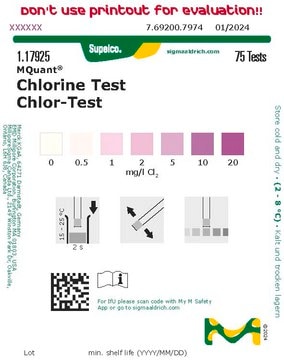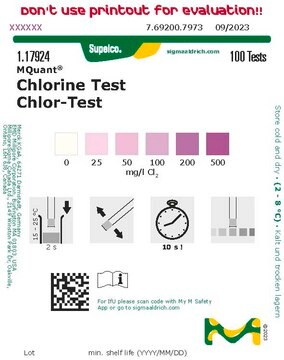1.00599
Chlorine Test, photometric
photometric, 0.010-6.00 mg/L (Cl2), Spectroquant®
About This Item
Polecane produkty
product name
Chlorine Test, photometric, 0.010-6.00 mg/L (Cl2), Spectroquant®
linia produktu
Spectroquant®
Poziom jakości
zastosowanie
sufficient for 200 tests ((free chlorine) or 100 (free chlorine) + 100 (total chlorine))
specyficzne anality
chlorine
zakres pomiaru
0.010-6.00 mg/L (Cl2)
metody
photometry: suitable
kompatybilność
for use with Spectroquant® Move 100
for use with Spectroquant® Move DC
for use with Spectroquant® Nova 60 A
for use with Spectroquant® Prove 100
for use with Spectroquant® Prove 300
for use with Spectroquant® Prove 600
metoda wykrywania
photometric (DPD)
temp. przechowywania
15-25°C
Opis ogólny
This Spectroquant® Chlorine test allows the accurate quantification. Chlorinated disinfectants are still in common use all over the world, their major applications being in the chlorination of drinking water and swimming pools. In weakly acidic solution free chlorine reacts with dipropyl-p-phenylenediamine (DPD) to form a red-violet dye that is determined photometrically. In the presence of potassium iodide, also combined chlorine is measured in this reaction.
The method is analogous to EPA 330.5, APHA 4500-Cl2 G, and DIN EN ISO 7393-2.
All our Cell and Reagent Test Kits are equipped with the unique Live ID (2D barcode) which allows seamless method recognition and contains essential information such as lot number, expiry date, and automatic calibration updates.
The Spectroquant® Reagent Test Kits contain highly stable, ready-to-use reagent mixtures to perform the analysis according to the procedure described in the accompanying instruction leaflet.
Zastosowanie
- 3,3′,5,5′-tetramethylbenzidine as multi-colorimetric indicator of chlorine in water in line with health guideline values.: This study demonstrates the use of 3,3′,5,5′-tetramethylbenzidine as a colorimetric indicator for detecting chlorine levels in water, providing a cost-effective and simple method for ensuring water safety in compliance with health guidelines (Palladino et al., 2020).
- Analysis of free chlorine in aqueous solution at very low concentration with lateral flow tests.: Investigates the effectiveness of lateral flow assays for the quantification of free chlorine in water, highlighting their potential for quick and accurate chlorine testing in field settings (Schwenke et al., 2019).
- Improved residual chlorine test; the ortho-toluidine: arsenite method for testing water for true, false and chloramine residuals.: Describes a methodological advancement in measuring different forms of chlorine residuals in water, enhancing the accuracy of water quality assessments (GILCREAS FW, 1948).
Informacje prawne
Hasło ostrzegawcze
Danger
Zwroty wskazujące rodzaj zagrożenia
Zwroty wskazujące środki ostrożności
Klasyfikacja zagrożeń
Eye Irrit. 2 - Repr. 1B - STOT RE 2 Oral
Organy docelowe
Thyroid
Kod klasy składowania
6.1D - Non-combustible, acute toxic Cat.3 / toxic hazardous materials or hazardous materials causing chronic effects
Klasa zagrożenia wodnego (WGK)
WGK 2
Temperatura zapłonu (°F)
Not applicable
Temperatura zapłonu (°C)
Not applicable
Certyfikaty analizy (CoA)
Poszukaj Certyfikaty analizy (CoA), wpisując numer partii/serii produktów. Numery serii i partii można znaleźć na etykiecie produktu po słowach „seria” lub „partia”.
Masz już ten produkt?
Dokumenty związane z niedawno zakupionymi produktami zostały zamieszczone w Bibliotece dokumentów.
Klienci oglądali również te produkty
Protokoły
Preparation of a standard solution for total chlorine.
Przygotowanie standardowego roztworu chloru całkowitego.
AQA Standard for free chlorine - Preparation of a standard solution for free chlorine
Preparation of a standard solution for free Chlorine according to DIN EN ISO 7393
Powiązane treści
Disinfection control solutions ensure food safety and regulatory compliance in food & beverage manufacturing.
Nasz zespół naukowców ma doświadczenie we wszystkich obszarach badań, w tym w naukach przyrodniczych, materiałoznawstwie, syntezie chemicznej, chromatografii, analityce i wielu innych dziedzinach.
Skontaktuj się z zespołem ds. pomocy technicznej










